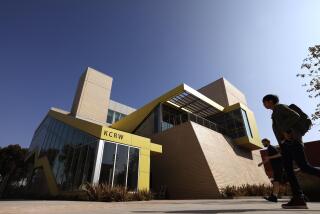Op-Ed: KPFK’s death by democracy
On Aug. 17, KPFK Pacifica Radio’s newly appointed general manager, Leslie Radford, called a staff meeting at the 56-year-old leftist public radio station. She promptly informed us that in two weeks’ time, all workers would have their salary cut in half for a period of four months. Although the decision was made in violation of our employee union contract, Radford — citing hundreds of thousands of dollars of debt — said her hands were tied.
Those of us on the inside are now wondering whether this already fragile institution can survive yet another austerity measure in a long line of layoffs and reductions. Continuous turnover of upper management over the last decade, coupled with nonexistent long-term financial planning, has turned Southern California’s oldest public radio station into a micro-version of Greece.
And just as ordinary Greeks were made to bear the brunt of a financial crisis that was not of their doing, KPFK’s staff members are facing cuts as a result of debts created by others. All of the decision-making over finances lies with an unwieldy, listener-dominated board that is in turn directing the general manager. Its plan to return us to solvency — if one can even call it a plan — appears to involve nearly constant on-air pledge drives, which of course bring in ever smaller amounts of money as we alienate our audience.
How did we get here? Fourteen years ago, a group of listeners mounted a successful legal challenge to the earlier, more traditional style of nonprofit governance that oversaw Pacifica Foundation, the five-station radio network of which KPFK is a part.
Led by a sincere belief that Pacifica was in danger of joining the homogenized ranks of NPR affiliates, they restructured the network with an emphasis on democratic decision-making. A system of regular elections would enable listeners and staff members to choose their own representatives to the local station boards, ensuring radical, commercial-free radio that promoted social justice — at least in theory.
Unfortunately, Pacifica’s version of democracy is primarily for those who consume the content, not those who produce it. Listeners are accorded 75% of board seats. The staff members are not guaranteed board representation and are lumped into the same category as volunteers who donate at least 10 hours of their time per month, together making up the remaining 25% of the board.
All five Pacifica stations are struggling to excite listeners to vote, but listener participation is so low at KPFK that the latest elections did not even have a quorum. (Audiences — surprise surprise — are more interested in top-quality news than in attending meetings.) As a result, KPFK’s current local board is made up of members whose terms expired long ago, or who were never actually elected but are temporarily filling vacated seats.
They don’t seem to be up to the job. Factional battles have consumed station resources and hampered KPFK’s ability to adapt to the rapidly changing media landscape. KPFK and Pacifica have always embraced “advocacy journalism,” which has emerged as a strong current in today’s online world of citizen journalism, but our station has failed to keep up with social-media-based innovation.
Recently, moreover, our board members fired an excellent manager and spiked his long-term vision, which included courting donors, luring foundations for special projects and organizing community events that double as fundraisers. He was replaced by Radford, who, after slashing salaries, told staff members that we could apply for California’s Work Sharing program to make up the difference, and then failed to complete KPFK’s application properly, leaving us in the lurch. She also abruptly changed show schedules, including mine. (Radford reduced my airtime by about half.)
But Pacifica’s national office, which is appointed by the network’s station boards, is also to blame for our plight. Some years ago, our annual grant of roughly $250,000 from the Corp. for Public Broadcasting was cut off, in part because the national office did not submit the necessary paperwork. This created a budgetary hole that’s never been filled.
Most public media organizations today rely on some combination of individual donations, corporate underwriting and foundational support. But at KPFK, listener financial support — as mentioned above — is dwindling because of relentless fundraising; Pacifica is generally suspicious of underwriting as being too close to advertising; and foundations are loath to touch stations, like KPFK, which are embroiled in controversy.
Much is at stake in the fight over KPFK. A station with a rich history in reporting from the front lines of social justice struggles, KPFK has not always lived up to its potential. But the morning and evening drive-time lineup is still valuable, produced by seasoned and diverse local and national radio hosts. Our 6 a.m.-to-11 a.m. lineup is dominated by women, which is extremely rare in major media markets.
There is a public hunger for the kind of commercial-free programming that KPFK offers: analysis that indicts capitalism for the ills of climate change, calls out police brutality, prioritizes the victims of war over the desires of warmongers and showcases struggles for social and political justice. But what we’ve built is in jeopardy.
Sonali Kolhatkar is the host and executive producer of “Uprising with Sonali,” heard on KPFK for the last 12 years.
Follow the Opinion section on Twitter @latimesopinion and Facebook
More to Read
A cure for the common opinion
Get thought-provoking perspectives with our weekly newsletter.
You may occasionally receive promotional content from the Los Angeles Times.






